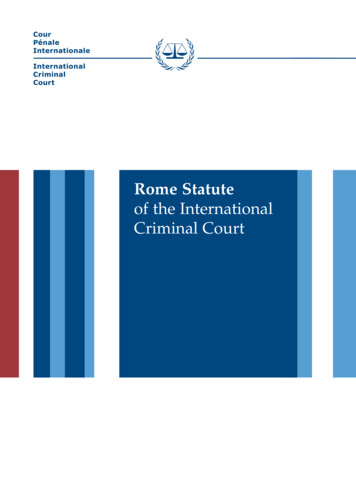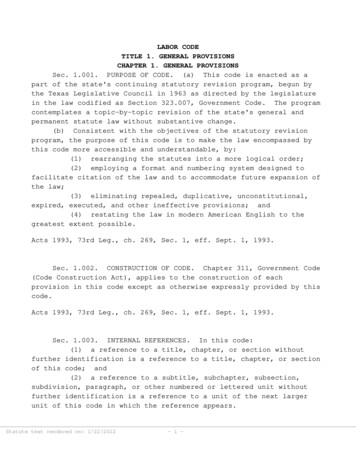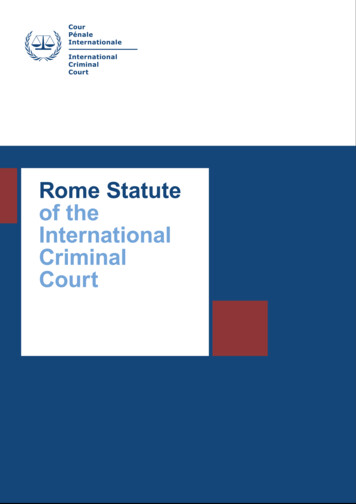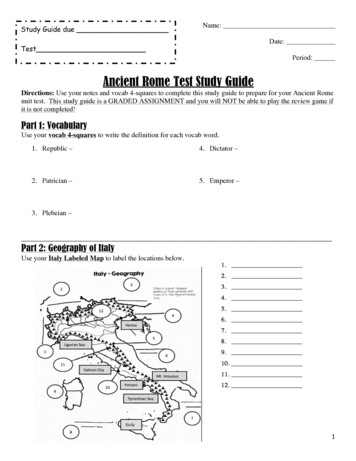
Transcription
Rome Statuteof the InternationalCriminal Court
Rome Statuteof the InternationalCriminal CourtThe text of the Rome Statute reproducedherein was originally circulated as documentA/CONF.183/9 of 17 July 1998 and corrected byprocès-verbaux of 10 November 1998, 12 July1999, 30 November 1999, 8 May 2000, 17 January2001 and 16 January 2002. The amendmentsto article 8 reproduce the text contained indepositary notification C.N.651.2010 Treaties-6,while the amendments regarding articles 8 bis,15 bis and 15 ter replicate the text contained indepositary notification C.N.651.2010 Treaties-8;both depositary communications are dated29 November 2010. The table of contents is notpart of the text of the Rome Statute adopted bythe United Nations Diplomatic Conference ofPlenipotentiaries on the Establishment of anInternational Criminal Court on 17 July 1998. Ithas been included in this publication for ease ofreference.Done at Rome on 17 July 1998, in force on 1 July2002, United Nations, Treaty Series, vol. 2187,No. 38544, Depositary: Secretary-General of theUnited Nations, http://treaties.un.org.
Rome Statute of the International Criminal CourtPublished by the International Criminal CourtISBN No. 92-9227-227-6ICC-PIDS-LT-01-002/11 EngCopyright International Criminal Court 2011All rights reservedPrinted by PrintPartners Ipskamp, EnschedeCover design: Corps ontwerpersInternational Criminal Court Po Box 19519 2500 CM The Hague The Netherlands www.icc-cpi.int
Rome Statute of the International Criminal CourtTable of Contents PREAMBLE 1PART 1. ESTABLISHMENT OF THE COURT 2Article 1Article 2Article 3Article 42222The Court Relationship of the Court with the United Nations Seat of the Court Legal status and powers of the Court PART 2. JURISDICTION, ADMISSIBILITY AND APPLICABLE LAW Article 5Crimes within the jurisdiction of the Court Article 6Genocide Article 7Crimes against humanity Article 8War crimes Article 8 bis Crime of aggression Article 9Elements of Crimes Article 10 Article 11Jurisdiction ratione temporis Article 12Preconditions to the exercise of jurisdiction Article 13Exercise of jurisdiction Article 14Referral of a situation by a State Party Article 15Prosecutor Article 15 bis Exercise of jurisdiction over the crime of aggression(State referral, proprio motu) Article 15 ter Exercise of jurisdiction over the crime of aggression(Security Council referral) Article 16Deferral of investigation or prosecution Article 17Issues of admissibility Article 18Preliminary rulings regarding admissibility Article 19Challenges to the jurisdiction of the Court or the admissibility of a case Article 20Ne bis in idem Article 21Applicable law 333359101010101111111213131314151616PART 3. GENERAL PRINCIPLES OF CRIMINAL LAW 18Article 22Article 23Article 24Article 25Article 26Article 27Article 28Article 29Article 30Article 31Article 321818181819191920202021Nullum crimen sine lege Nulla poena sine lege Non-retroactivity ratione personae Individual criminal responsibility Exclusion of jurisdiction over persons under eighteen Irrelevance of official capacity Responsibility of commanders and other superiors Non-applicability of statute of limitations Mental element Grounds for excluding criminal responsibility Mistake of fact or mistake of law
Rome Statute of the International Criminal CourtArticle 33Superior orders and prescription of law 21PART 4. COMPOSITION AND ADMINISTRATION OF THE COURT Article 34Article 35Article 36Article 37Article 38Article 39Article 40Article 41Article 42Article 43Article 44Article 45Article 46Article 47Article 48Article 49Article 50Article 51Article 52Organs of the Court Service of judges Qualifications, nomination and election of judges Judicial vacancies The Presidency Chambers Independence of the judges Excusing and disqualification of judges The Office of the Prosecutor The Registry Staff Solemn undertaking Removal from office Disciplinary measures Privileges and immunities Salaries, allowances and expenses Official and working languages Rules of Procedure and Evidence Regulations of the Court 2323232325252627272728292929303031313132PART 5. INVESTIGATION AND PROSECUTION 33Article 53Article 54Article 55Article 56333434Article 57Article 58Article 59Article 60Article 61Initiation of an investigation Duties and powers of the Prosecutor with respect to investigations Rights of persons during an investigation Role of the Pre-Trial Chamber in relation to a unique investigativeopportunity Functions and powers of the Pre-Trial Chamber Issuance by the Pre-Trial Chamber of a warrant of arrest or a summonsto appear Arrest proceedings in the custodial State Initial proceedings before the Court Confirmation of the charges before trial 353637383939PART 6. THE TRIAL 41Article 62Article 63Article 64Article 65Article 66Article 67Article 68414141424343Article 69Place of trial Trial in the presence of the accused Functions and powers of the Trial Chamber Proceedings on an admission of guilt Presumption of innocence Rights of the accused Protection of the victims and witnesses and their participation inthe proceedings Evidence 4445
Rome Statute of the International Criminal CourtArticle 70Article 71Article 72Article 73Article 74Article 75Article 76Offences against the administration of justice Sanctions for misconduct before the Court Protection of national security information Third-party information or documents Requirements for the decision Reparations to victims Sentencing 46464748484949PART 7. PENALTIES 50Article 77Article 78Article 79Article 8050505050Applicable penalties Determination of the sentence Trust Fund Non-prejudice to national application of penalties and national laws PART 8. APPEAL AND REVISION 51Article 81Article 82Article 83Article 84Article 855152525353Appeal against decision of acquittal or conviction or against sentence Appeal against other decisions Proceedings on appeal Revision of conviction or sentence Compensation to an arrested or convicted person PART 9. INTERNATIONAL COOPERATION AND JUDICIALASSISTANCE Article 86Article 87Article 88Article 89Article 90Article 91Article 92Article 93Article 94Article 95Article 96Article 97Article 98Article 99Article 100Article 101Article 102General obligation to cooperate Requests for cooperation: general provisions Availability of procedures under national law Surrender of persons to the Court Competing requests Contents of request for arrest and surrender Provisional arrest Other forms of cooperation Postponement of execution of a request in respect of ongoing investigationor prosecution Postponement of execution of a request in respect of an admissibilitychallenge Contents of request for other forms of assistance under article 93 Consultations Cooperation with respect to waiver of immunity and consent to surrender Execution of requests under articles 93 and 96 Costs Rule of speciality Use of terms 555555565657585959616262626363646464PART 10. ENFORCEMENT 65Article 10365Role of States in enforcement of sentences of imprisonment
Rome Statute of the International Criminal CourtArticle 104Article 105Article 106Article 107Article 108Article 109Article 110Article 111Change in designation of State of enforcement Enforcement of the sentence Supervision of enforcement of sentences and conditions of imprisonment Transfer of the person upon completion of sentence Limitation on the prosecution or punishment of other offences Enforcement of fines and forfeiture measures Review by the Court concerning reduction of sentence Escape 6566666666676768PART 11. ASSEMBLY OF STATES PARTIES 69Article 112Assembly of States Parties 69PART 12. FINANCING 71Article 113Article 114Article 115Article 116Article 117Article 118717171717171Financial Regulations Payment of expenses Funds of the Court and of the Assembly of States Parties Voluntary contributions Assessment of contributions Annual audit PART 13. FINAL CLAUSES 72Article 119Article 120Article 121Article 122Article 123Article 124Article 125Article 126Article 127Article 12872727273737373747474Settlement of disputes Reservations Amendments Amendments to provisions of an institutional nature Review of the Statute Transitional Provision Signature, ratification, acceptance, approval or accession Entry into force Withdrawal Authentic texts
Rome Statute of the International Criminal CourtPREAMBLEThe States Parties to this Statute,Conscious that all peoples are united by common bonds, their cultures piecedtogether in a shared heritage, and concerned that this delicate mosaic may beshattered at any time,Mindful that during this century millions of children, women and men have beenvictims of unimaginable atrocities that deeply shock the conscience of humanity,Recognizing that such grave crimes threaten the peace, security and well-being ofthe world,Affirming that the most serious crimes of concern to the international community asa whole must not go unpunished and that their effective prosecution must be ensuredby taking measures at the national level and by enhancing international cooperation,Determined to put an end to impunity for the perpetrators of these crimes and thusto contribute to the prevention of such crimes,Recalling that it is the duty of every State to exercise its criminal jurisdiction overthose responsible for international crimes,Reaffirming the Purposes and Principles of the Charter of the United Nations, andin particular that all States shall refrain from the threat or use of force against theterritorial integrity or political independence of any State, or in any other mannerinconsistent with the Purposes of the United Nations,Emphasizing in this connection that nothing in this Statute shall be taken asauthorizing any State Party to intervene in an armed conflict or in the internal affairsof any State,Determined to these ends and for the sake of present and future generations, toestablish an independent permanent International Criminal Court in relationshipwith the United Nations system, with jurisdiction over the most serious crimes ofconcern to the international community as a whole,Emphasizing that the International Criminal Court established under this Statuteshall be complementary to national criminal jurisdictions,Resolved to guarantee lasting respect for and the enforcement of internationaljustice,Have agreed as follows:1
Rome Statute of the International Criminal CourtPART 1. ESTABLISHMENT OF THE COURTArticle 1The CourtAn International Criminal Court ("the Court") is hereby established. It shall be a permanentinstitution and shall have the power to exercise its jurisdiction over persons for the most seriouscrimes of international concern, as referred to in this Statute, and shall be complementary tonational criminal jurisdictions. The jurisdiction and functioning of the Court shall be governedby the provisions of this Statute.Article 2Relationship of the Court with the United NationsThe Court shall be brought into relationship with the United Nations through an agreement tobe approved by the Assembly of States Parties to this Statute and thereafter concluded by thePresident of the Court on its behalf.Article 3Seat of the Court1.The seat of the Court shall be established at The Hague in the Netherlands ("the hostState").2.The Court shall enter into a headquarters agreement with the host State, to beapproved by the Assembly of States Parties and thereafter concluded by the Presidentof the Court on its behalf.3.The Court may sit elsewhere, whenever it considers it desirable, as provided in thisStatute.Article 4Legal status and powers of the Court1.The Court shall have international legal personality. It shall also have such legalcapacity as may be necessary for the exercise of its functions and the fulfilment of itspurposes.2.The Court may exercise its functions and powers, as provided in this Statute, on theterritory of any State Party and, by special agreement, on the territory of any otherState.2
Rome Statute of the International Criminal CourtPART 2. JURISDICTION, ADMISSIBILITY AND APPLICABLELAWArticle 51Crimes within the jurisdiction of the CourtThe jurisdiction of the Court shall be limited to the most serious crimes of concernto the international community as a whole. The Court has jurisdiction in accordancewith this Statute with respect to the following crimes:(a)The crime of genocide;(b)Crimes against humanity;(c)War crimes;(d)The crime of aggression.Article 6GenocideFor the purpose of this Statute, "genocide" means any of the following acts committedwith intent to destroy, in whole or in part, a national, ethnical, racial or religiousgroup, as such:(a)Killing members of the group;(b)Causing serious bodily or mental harm to members of the group;(c)Deliberately inflicting on the group conditions of life calculated to bringabout its physical destruction in whole or in part;(d)Imposing measures intended to prevent births within the group;(e)Forcibly transferring children of the group to another group.Article 7Crimes against humanity1.1For the purpose of this Statute, "crime against humanity" means any of the followingacts when committed as part of a widespread or systematic attack directed againstany civilian population, with knowledge of the d)Deportation or forcible transfer of population;(e)Imprisonment or other severe deprivation of physical liberty in violation offundamental rules of international law;Paragraph 2 of article 5 (“The Court shall exercise jurisdiction over the crime of aggression once a provision isadopted in accordance with articles 121 and 123 defining the crime and setting out the conditions under whichthe Court shall exercise jurisdiction with respect to this crime. Such a provision shall be consistent with therelevant provisions of the Charter of the United Nations.”) was deleted in accordance with RC/Res.6, annex I, of11 June 2010.3
Rome Statute of the International Criminal Court2.4(f)Torture;(g)Rape, sexual slavery, enforced prostitution, forced pregnancy, enforcedsterilization, or any other form of sexual violence of comparable gravity;(h)Persecution against any identifiable group or collectivity on political, racial,national, ethnic, cultural, religious, gender as defined in paragraph 3, or othergrounds that are universally recognized as impermissible under internationallaw, in connection with any act referred to in this paragraph or any crimewithin the jurisdiction of the Court;(i)Enforced disappearance of persons;(j)The crime of apartheid;(k)Other inhumane acts of a similar character intentionally causing greatsuffering, or serious injury to body or to mental or physical health.For the purpose of paragraph 1:(a)"Attack directed against any civilian population" means a course of conductinvolving the multiple commission of acts referred to in paragraph 1against any civilian population, pursuant to or in furtherance of a State ororganizational policy to commit such attack;(b)"Extermination" includes the intentional infliction of conditions of life, interalia the deprivation of access to food and medicine, calculated to bring aboutthe destruction of part of a population;(c)"Enslavement" means the exercise of any or all of the powers attaching to theright of ownership over a person and includes the exercise of such power inthe course of trafficking in persons, in particular women and children;(d)"Deportation or forcible transfer of population" means forced displacementof the persons concerned by expulsion or other coercive acts from thearea in which they are lawfully present, without grounds permitted underinternational law;(e)"Torture" means the intentional infliction of severe pain or suffering, whetherphysical or mental, upon a person in the custody or under the control of theaccused; except that torture shall not include pain or suffering arising onlyfrom, inherent in or incidental to, lawful sanctions;(f)"Forced pregnancy" means the unlawful confinement of a woman forciblymade pregnant, with the intent of affecting the ethnic composition of anypopulation or carrying out other grave violations of international law. Thisdefinition shall not in any way be interpreted as affecting national lawsrelating to pregnancy;(g)"Persecution" means the intentional and severe deprivation of fundamentalrights contrary to international law by reason of the identity of the group orcollectivity;(h)"The crime of apartheid" means inhumane acts of a character similar to thosereferred to in paragraph 1, committed in the context of an institutionalizedregime of systematic oppression and domination by one racial group over anyother racial group or groups and committed with the intention of maintainingthat regime;
Rome Statute of the International Criminal Court(i)3."Enforced disappearance of persons" means the arrest, detention orabduction of persons by, or with the authorization, support or acquiescenceof, a State or a political organization, followed by a refusal to acknowledgethat deprivation of freedom or to give information on the fate or whereaboutsof those persons, with the intention of removing them from the protection ofthe law for a prolonged period of time.For the purpose of this Statute, it is understood that the term "gender" refers to thetwo sexes, male and female, within the context of society. The term "gender" does notindicate any meaning different from the above.Article 82War crimes1.The Court shall have jurisdiction in respect of war crimes in particular whencommitted as part of a plan or policy or as part of a large-scale commission of suchcrimes.2.For the purpose of this Statute, "war crimes" means:(a)Grave breaches of the Geneva Conventions of 12 August 1949, namely, any ofthe following acts against persons or property protected under the provisionsof the relevant Geneva Convention:(i)Wilful killing;(ii)Torture or inhuman treatment, including biological experiments;(iii)Wilfully causing great suffering, or serious injury to body or health;(iv)Extensive destruction and appropriation of property, not justified bymilitary necessity and carried out unlawfully and wantonly;(v)Compelling a prisoner of war or other protected person to serve in theforces of a hostile Power;(vi)Wilfully depriving a prisoner of war or other protected person of therights of fair and regular trial;(vii)Unlawful deportation or transfer or unlawful confinement;(viii) Taking of hostages.(b)2Other serious violations of the laws and customs applicable in internationalarmed conflict, within the established framework of international law,namely, any of the following acts:(i)Intentionally directing attacks against the civilian population as suchor against individual civilians not taking direct part in hostilities;(ii)Intentionally directing attacks against civilian objects, that is, objectswhich are not military objectives;(iii)Intentionally directing attacks against personnel, installations,material, units or vehicles involved in a humanitarian assistance orpeacekeeping mission in accordance with the Charter of the UnitedNations, as long as they are entitled to the protection given to civiliansor civilian objects under the international law of armed conflict;Paragraphs 2 (e) (xiii) to 2 (e) (xv) were amended by resolution RC/Res.5 of 11 June 2010 (addingparagraphs 2 (e) (xiii) to 2 (e) (xv)).5
Rome Statute of the International Criminal Court(iv)Intentionally launching an attack in the knowledge that such attackwill cause incidental loss of life or injury to civilians or damage tocivilian objects or widespread, long-term and severe damage to thenatural environment which would be clearly excessive in relation tothe concrete and direct overall military advantage anticipated;(v)Attacking or bombarding, by whatever means, towns, villages,dwellings or buildings which are undefended and which are notmilitary objectives;(vi)Killing or wounding a combatant who, having laid down his arms orhaving no longer means of defence, has surrendered at discretion;(vii)Making improper use of a flag of truce, of the flag or of the militaryinsignia and uniform of the enemy or of the United Nations, as wellas of the distinctive emblems of the Geneva Conventions, resulting indeath or serious personal injury;(viii) The transfer, directly or indirectly, by the Occupying Power of partsof its own civilian population into the territory it occupies, or thedeportation or transfer of all or parts of the population of the occupiedterritory within or outside this territory;(ix)Intentionally directing attacks against buildings dedicated to religion,education, art, science or charitable purposes, historic monuments,hospitals and places where the sick and wounded are collected,provided they are not military objectives;(x)Subjecting persons who are in the power of an adverse party tophysical mutilation or to medical or scientific experiments of any kindwhich are neither justified by the medical, dental or hospital treatmentof the person concerned nor carried out in his or her interest, andwhich cause death to or seriously endanger the health of such personor persons;(xi)Killing or wounding treacherously individuals belonging to the hostilenation or army;(xii)Declaring that no quarter will be given;(xiii) Destroying or seizing the enemy's property unless such destruction orseizure be imperatively demanded by the necessities of war;(xiv) Declaring abolished, suspended or inadmissible in a court of law therights and actions of the nationals of the hostile party;(xv)Compelling the nationals of the hostile party to take part in theoperations of war directed against their own country, even if they werein the belligerent's service before the commencement of the war;(xvi) Pillaging a town or place, even when taken by assault;(xvii) Employing poison or poisoned weapons;(xviii) Employing asphyxiating, poisonous or other gases, and all analogousliquids, materials or devices;(xix) Employing bullets which expand or flatten easily in the human body,such as bullets with a hard envelope which does not entirely cover thecore or is pierced with incisions;6
Rome Statute of the International Criminal Court(xx)Employing weapons, projectiles and material and methods of warfarewhich are of a nature to cause superfluous injury or unnecessarysuffering or which are inherently indiscriminate in violation of theinternational law of armed conflict, provided that such weapons,projectiles and material and methods of warfare are the subject ofa comprehensive prohibition and are included in an annex to thisStatute, by an amendment in accordance with the relevant provisionsset forth in articles 121 and 123;(xxi) Committing outrages upon personal dignity, in particular humiliatingand degrading treatment;(xxii) Committing rape, sexual slavery, enforced prostitution, forcedpregnancy, as defined in article 7, paragraph 2 (f), enforced sterilization,or any other form of sexual violence also constituting a grave breach ofthe Geneva Conventions;(xxiii) Utilizing the presence of a civilian or other protected person torender certain points, areas or military forces immune from militaryoperations;(xxiv) Intentionally directing attacks against buildings, material, medicalunits and transport, and personnel using the distinctive emblems ofthe Geneva Conventions in conformity with international law;(xxv) Intentionally using starvation of civilians as a method of warfare bydepriving them of objects indispensable to their survival, includingwilfully impeding relief supplies as provided for under the GenevaConventions;(xxvi) Conscripting or enlisting children under the age of fifteen years intothe national armed forces or using them to participate actively inhostilities.(c)(d)In the case of an armed conflict not of an international character, seriousviolations of article 3 common to the four Geneva Conventions of 12 August1949, namely, any of the following acts committed against persons taking noactive part in the hostilities, including members of armed forces who havelaid down their arms and those placed hors de combat by sickness, wounds,detention or any other cause:(i)Violence to life and person, in particular murder of all kinds, mutilation,cruel treatment and torture;(ii)Committing outrages upon personal dignity, in particular humiliatingand degrading treatment;(iii)Taking of hostages;(iv)The passing of sentences and the carrying out of executions withoutprevious judgement pronounced by a regularly constituted court,affording all judicial guarantees which are generally recognized asindispensable.Paragraph 2 (c) applies to armed conflicts not of an international characterand thus does not apply to situations of internal disturbances and tensions,such as riots, isolated and sporadic acts of violence or other acts of a similarnature.7
Rome Statute of the International Criminal Court(e)Other serious violations of the laws and customs applicable in armedconflicts not of an international character, within the established frameworkof international law, namely, any of the following acts:(i)Intentionally directing attacks against the civilian population as suchor against individual civilians not taking direct part in hostilities;(ii)Intentionally directing attacks against buildings, material, medicalunits and transport, and personnel using the distinctive emblems ofthe Geneva Conventions in conformity with international law;(iii)Intentionally directing attacks against personnel, installations,material, units or vehicles involved in a humanitarian assistance orpeacekeeping mission in accordance with the Charter of the UnitedNations, as long as they are entitled to the protection given to civiliansor civilian objects under the international law of armed conflict;(iv)Intentionally directing attacks against buildings dedicated to religion,education, art, science or charitable purposes, historic monuments,hospitals and places where the sick and wounded are collected,provided they are not military objectives;(v)Pillaging a town or place, even when taken by assault;(vi)Committing rape, sexual slavery, enforced prostitution, forcedpregnancy, as defined in article 7, paragraph 2 (f), enforced sterilization,and any other form of sexual violence also constituting a seriousviolation of article 3 common to the four Geneva Conventions;(vii)Conscripting or enlisting children under the age of fifteen yearsinto armed forces or groups or using them to participate actively inhostilities;(viii) Ordering the displacement of the civilian population for reasonsrelated to the conflict, unless the security of the civilians involved orimperative military reasons so demand;(ix)Killing or wounding treacherously a combatant adversary;(x)Declaring that no quarter will be given;(xi)Subjecting persons who are in the power of another party to theconflict to physical mutilation or to medical or scientific experiments ofany kind which are neither justified by the medical, dental or hospitaltreatment of the person concerned nor carried out in his or her interest,and which cause death to or seriously endanger the health of suchperson or persons;(xii)Destroying or seizing the property of an adversary unless suchdestruction or seizure be imperatively demanded by the necessities ofthe conflict;(xiii) Employing poison or poisoned weapons;(xiv) Employing asphyxiating, poisonous or other gases, and all analogousliquids, materials or devices;(xv)8Employing bullets which expand or flatten easily in the human body,such as bullets with a hard envelope which does not entirely cover thecore or is pierced with incisions.
Rome Statute of the International Criminal Court(f)3.Paragraph 2 (e) applies to armed conflicts not of an international characterand thus does not apply to situations of internal disturbances and tensions,such as riots, isolated and sporadic acts of violence or other acts of a similarnature. It applies to armed conflicts that take place in the territory of a Statewhen there is protracted armed conflict between governmental authoritiesand organized armed groups or between such groups.Nothing in paragraph 2 (c) and (e) shall affect the responsibility of a Governmentto maintain or re-establish law and order in the State or to defend the unity andterritorial integrity of the State, by all legitimate means.Article 8 bis3Crime of aggression1.For the purpose of this Statute, “crime of aggression” means the planning, preparation,initiation or execution, by a person in a position effectively to exercise control over orto direct the political or military action of a State, of an act of aggression which, byits character, gravity and scale, constitutes a manifest violation of the Charter of theUnited Nations.2.For the purpose of paragraph 1, “act of aggression” means the use of armed force by aState against the sovereignty, territorial integrity or political independence of anotherState, or in any other manner inconsistent with the Charter of the United Nations.Any of the following acts, regardless of a declaration of war, shall, in accordancewith United Nations General Assembly resolution 3314 (XXIX) of 14 December 1974,qualify as an act of aggression:3(a)The invasion or attack by the armed forces of a State of the territory of anotherState, or any military occupation, however temporary, resulting from suchinvasion or attack, or any annexation by the use of force of the territory ofanother State or part thereof;(b)Bombardment by the armed forces of a State against the territory of anotherState or the use of any weapons by a State against the territory of anotherState;(c)The blockade of the ports or coasts of a State by the armed forces of anotherState;(d)An attack by the armed forces of a State on the land, sea or air forces, ormarine and air fleets of another State;(e)The use of armed forces of one State which
The text of the Rome Statute reproduced herein was originally circulated as document A/CONF.183/9 of 17 July 1998 and corrected by procès-verbaux of 10 November 1998, 12 July 1999, 30 November 1999, 8 May 2000, 17 January 2001 and 16 January 2002. The amendments to article










